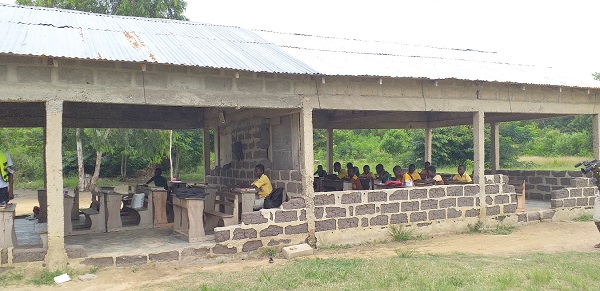Seven island communities on the Volta Lake in the Anloga District of the Volta Region have called on the government to urgently provide them with social amenities to improve their living standards.
The communities, namely, Wenyagor, Fuveme, Bomingo, Genui, Lawoshinu, Agorvinu and Hatorgodo, which are separated by a distance of one or two kilometres, are deprived of basic needs such as potable water, good roads, classroom blocks, quality health, electricity and quality education.
A media tour of the communities revealed the sorry state of educational facilities, which ultimately compromises the quality of education for children in those communities. The Bomingo E.P. Basic School, for instance, which has a population of 150 pupils, is in a deplorable state.
The school serves five other Island communities, including Tunu, Golepe, Korshikope, Dzogborve and Galosuta. Teachers sit under an open shed with thatched roof, with no furniture, which serves as the staff common room.
The primary school is in no better condition. The structure is supported by weak sticks which hold the roof, posing a danger to the lives of the pupils.
The tour of the island communities was organised by the Ghana National Association of Teachers (GNAT) in response to numerous calls made by teachers in the communities to assist them with life jackets for their safety, as they spend a total of between 30 minutes and one hour crossing the river to and from the schools on a daily basis.
At Fuveme, the story is not different. The Fuveme Star of the Sea R/C Basic School, with a population of 321 pupils lacks adequate classroom space and teachers.
Hence two primary classes, and in some cases three, classes are combined.
The pupils also sit on the bare floor in the sand with an aluminium roofing to provide shade. The headmaster's office also serves as the storeroom for the school.
The Assistant Headmaster of Bomingo E.P. Basic School, Mr James Atideku, catalogued a number of challenges facing the school.
These include lack of bungalows for teachers and inadequate furniture for both teachers and pupils.
He requested for solar panels in the absence of power from the national electricity grid to enable them to use their computers and also charge their gadgets.
Mr Atideku also appealed for the extension of the school feeding programme to the school to boost enrolment.
This, he explained, was because currently a lot of schoolchildren were not in school, because of the high poverty rate and single parenting in the communities.
Mr Atideku said these challenges notwithstanding, the school recorded a 100 per cent pass in the Basic Education Certificate Examination (BECE) in 2015.
The headmaster of the Fuveme Star of the Sea R/C Basic School, Mr Cornelius Adzido, also called on the government to take urgent steps to develop the school. He indicated that the current state of the school was not convenient for quality learning, stressing that the children in the community deserve equal opportunities to quality education in order to develop their potential.
The leader of the team from GNAT, who is also the Head of Department, Membership Education of GNAT, Mr Thomas Musah, donated 35 life jackets estimated at GHc4,000.00 to the teachers in seven schools in the communities.
He assured the teachers that GNAT would continue to act to ensure their safety when crossing the Volta lake and also assist them to realise their potential.
Mr Musah expressed concern about the rate at which pupils in such communities drop out of school as a result of unfavourable teaching and learning conditions.
According to him,: "56 per cent of the country’s human resource would go to waste if nothing was done about the high rate of dropouts in such deplorable schools".
He pledged the continuous support of GNAT for the teachers in these deprived communities in order to ensure universal quality of teaching and learning for all schoolchildren of Ghana.
Credit:Graphic
READ ALSO :Â
Â
Â





